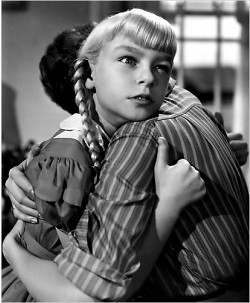Patty McCormack, left, and Nancy Kelly in the 1956 film “The Bad Seed.” The Everett Collection, via the New York Times
I almost didn’t address this Times story on “bad seeds,” written by a psychiatrist, but a few people asked, given my interest in child-raising and the interplay of nature and nurture and behavioral genetics, and once I gave it some thought I realized it was interesting in its central omission. It opens with a description of a patient whose child has grown into an adult she doesn’t much like. The author, after nothing that other therapists had suggested their parenting might lack in some key areas, largely sets that concern aside:
It’s interesting (but not novel) to note that decent or even good parents can end up with kids that, ah, don’t work out. If you’ve raised kids and watched others raised kids, you’ve seen this. And even good kids sometimes get two wheels in the ditch; they usually correct and get back on the pavement. So nothing new there.
Yet this story raises the subject — and doesn’t really add much. It toys with the nature-nurture issue — but to no gain, because it’s raised just to set aside without any real examination. He ends up concluding the kid’d just not a nice kid; but this we knew to start.
The mistake was setting up the innate v trained polarity to start with, as if the answer lay at one end of the other. As Karen James noted on Twitter, It shouldn’t surprise us that you can’t always (or ever) untangle the complex entwinement of nature and nurture? Nature and nurture isn’t an either-or or even a ping-pong game. It’s a conversation in which both are simultaneously talking and listening to one another. You can’t separate the effect. Each depends on the other for its salience: genes mean nothing without experience; experience can’t exist without genes. Life is complicated.
That said, I don’t think the parenting gets a pass in this case just because these parents raised two good boys. I’m not looking to blame the parents. But to move the parenting off the table assumes they treated all three kids roughly the same, when even the psychiatrist here notes they probably treated the difficult boy differently.
I suspect that in him these parents met a challenge they didn’t know how to handle.
That doesn’t damn them; parenting is hard. It’s the hardest thing. Yet I would think that most people who have raised more than one kid knows that each presents certain challenges, and a given parent will find it much easier to meet some challenges than others. Calming a meltdown draws on you differently than, say, getting a kid to brush regularly or do her homework. A shy child raises different challenges than one incredibly outgoing; an angry child needs a different response than a sad child. Parenting goes well when your response matches well the moment. We’re all better at some of these than others.
And as I noted in “The Orchid Hypothesis,” these interactions can hinge on tiny moments the parent may not even be aware of.
Bakermans-Kranenburg, who worked up the video intervention being described above, told me the key to improving the parenting — and thus the kids’ behavior — was getting parents to spot, in the videos the researchers took of them, the fleeting moments in which a good moment starts to turn bad, and other moments in which the parents managed to spot trouble coming and turn the moment good. The parents having trouble with their toddlers usually weren’t spotting the tiny cues that signalled those crucial moments. When they learned to, things started to improve. Big doors swing on small hinges. That’s the mystery of parenting, and of how people become what they become. This story missed that. Check it out at Mind: Accepting That Good Parents May Plant Bad Seeds













